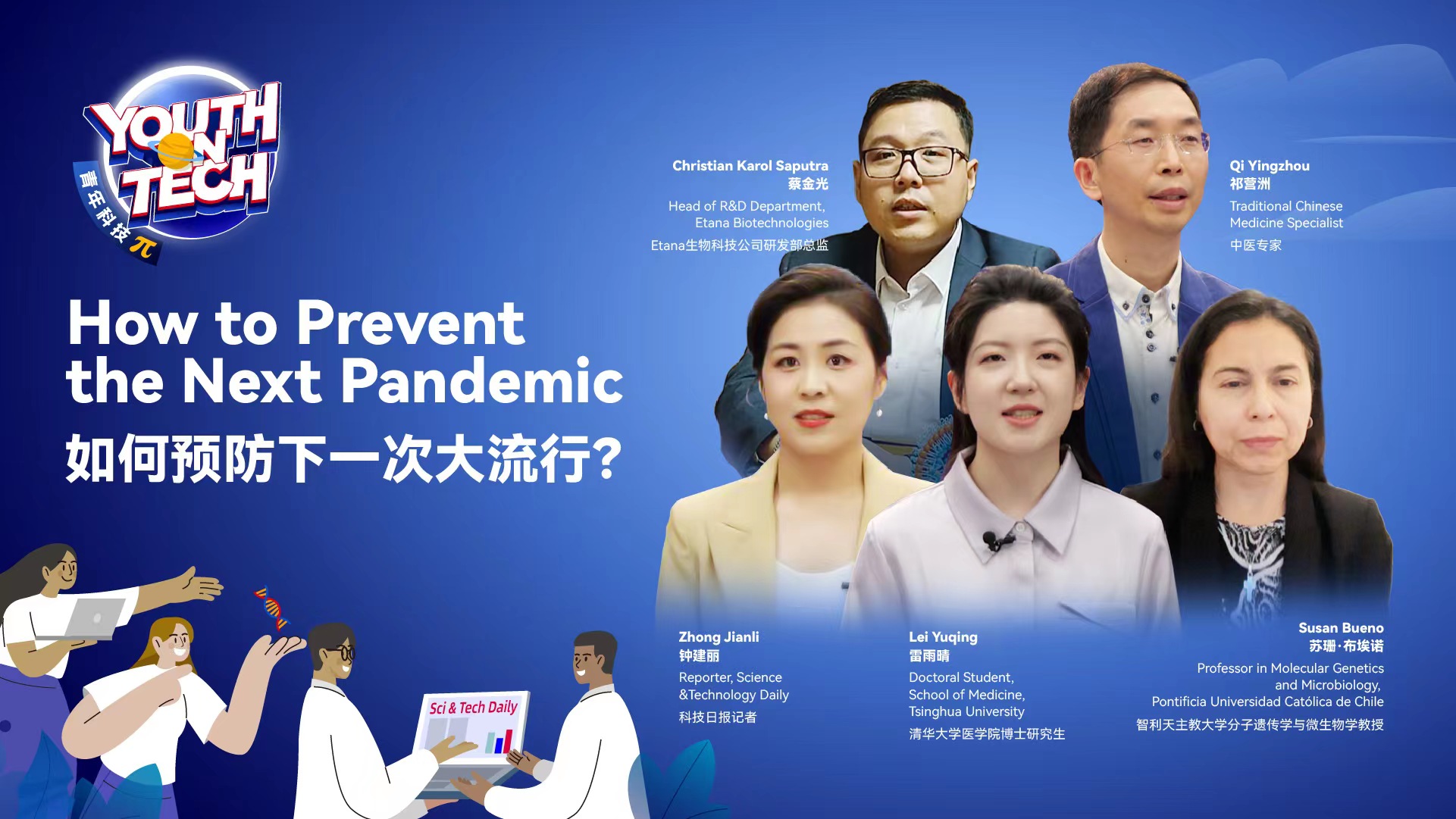Youth on Tech | Preventing the Next Pandemic
Editor's Notes:
Youth on Tech is a brand-new program produced by Science and Technology Daily. In this program, we invite young scientists from around the world to discuss trending sci-tech topics, with the aim to enhance understanding between youth worldwide and work together to make our planet a better place.
During the 2023 World Immunization Week (April 24 to 30), four guests in different specializations offered their insights on how to prevent the next pandemic, covering vaccine development, traditional Chinese medicine practice, international scientific collaboration, and guide for individuals.

By ZHONG Jianli
Throughout history, humans have faced an ongoing fight against pandemics. The recent COVID-19 pandemic once again made us realize how vulnerable humans are in face of a pandemic.
Why are there so many pandemics?
Since 2009, the World Health Organization (WHO) has declared six public health emergencies of international concern — H1N1, poliovirus, Ebola (twice), Zika, and COVID-19. Since 2014, the WHO has declared an outbreak every two years on average.
"There are many factors that contribute to the occurrence of pandemics, including the climate change and globalization," said Lei Yuqing, a doctoral student in vaccine research and development at Tsinghua University.
Lei stated that the growing interaction between humans and wild animals has increased the possibility of pathogens jumping from animals to humans, leading to the emergence of many infectious diseases.
Lack of preparedness can also lead an outbreak to progress into a pandemic, said Christian Karol Saputra, head of the R&D department of Etana Biotechnologies in Indonesia, adding that outbreaks that are not treated with proper coordination and cooperation among governments, health authorities, and communities can easily turn into pandemics.
How to be better prepared?
Vaccines play an important role in pandemic control in public health and social governance, said Lei, adding that at this time, scientists are aimed at developing universal vaccines, such as pan-variant or even pan-coronavirus vaccines for SARS-CoV-2, to broadly protect people against virus variants.
Susan Bueno, full professor in molecular genetics and microbiology at Pontificia Universidad Católica de Chile, agreed that vaccines are the most cost-effective way to prevent infectious diseases.
She stressed the importance of strengthening research capacities of all countries to quickly develop new pathogen-fighting vaccines and enhance the capacity to produce and test these vaccines in clinical trials.
Having been engaged in the bio-medicine industry for many years, Saputra suggested that it is necessary to promote academic-business-government (ABG) partnerships. Through ABG, public and private sectors can work together to promote collaborative research and development of vaccines.
As for how traditional Chinese medicine (TCM) helps fight pandemics, Qi Yingzhou, a TCM doctor, offered his insights.
He said in the past three years, during which COVID-19 was rampant in many countries, TCM relief supplies provided great help to the treatment of patients around the world.
Explaining how TCM works, he said TCM treatment pays more attention to improving patients' internal environment, in order to enhance their own disease resistance.
How to strengthen international cooperation?
"The COVID-19 pandemic has shown that the cooperation between scientists around the world was key for the identification of virus and the development of vaccines," said Bueno, stressing that one of the important things for scientific collaboration was a full sharing of scientific results and knowledge.
Lei also believes collaboration is significant to the progress of scientific research. She hopes universities, research institutes and governments could give more opportunities to the youth to join in sci-tech collaborations and communications.
Regarding how to narrow gaps in vaccine distribution internationally, Saputra proposed several strategies, including increasing production capacities, improving supply chains, and supporting technology and knowledge transfer between countries.
What can individuals do?
Developing a healthy lifestyle —eat regularly, live regularly, exercise moderately, and feel good — is the key to reducing the incidence of all kinds of diseases, including transmissible ones, said Qi.
He also mentioned both TCM and the Western medicine theories believe it is very important to cut off epidemic sources and that proper quarantine measures are needed in the early stage of an outbreak.
Lei suggested individuals, especially the youth, to be cautious about disinformation or misleading information on social media when a pandemic occurs.
Getting a better knowledge of what scientific research is doing and what needs to be done is essential for people to address the challenges now and in the future, noted Bueno.
She thus called for young people to join into research careers and learn more about infectious diseases, public health, as well as vaccine development and production.






